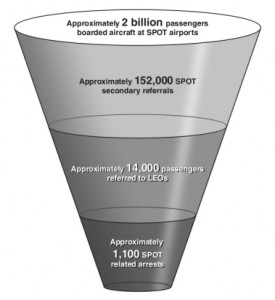Is “SPOT” a reasonable basis for suspicion or surveillance?
Today the Government Accountability Office released a detailed report on the TSA’s “Screening Passengers by Observation Techniques” (SPOT) program, providing considerably more detail than the TSA itself has ever provided, confirming the lack of any evidence that the program has spotted any terrorists, and suggesting implicitly that the DHS has been keeping yet another set of illegal records about innocent travelers.
We’ve followed the SPOT program since its existence was first revealed in 2004, and we’ve been detained, interrogated, and subjected to more intrusive search ourselves after being picked out by SPOT “Behavior Detection Officers”. (Fancy language for, “They didn’t like our looks, so they harassed us and gave us a thorough shakedown.”)
The SPOT program is the TSA’s attempt to adopt Israeli-style passenger profiling based on appearance and behavior (isn’t that supposed to be un-American, or at least illegal?), and now has a budget of more than $200 million a year. As shown in the diagram above from the GAO report, more than 150,000 people have been subjected to more intrusive search or interrogation as a result of being fingered by BDOs as “suspicious” or allegedly fitting the (secret, of course, this being the TSA) SPOT appearance and behavior profile. In 14,000 cases, police were called and passengers detained for “investigation”, typically including a police demand for, and logging of, their ID.
The GAO report serves mainly to confirm the obvious: There is no scientific evidence that the SPOT program has identified any actual would-be terrorists, or provides any legitimate basis for suspicion of those it singles out: Read More
